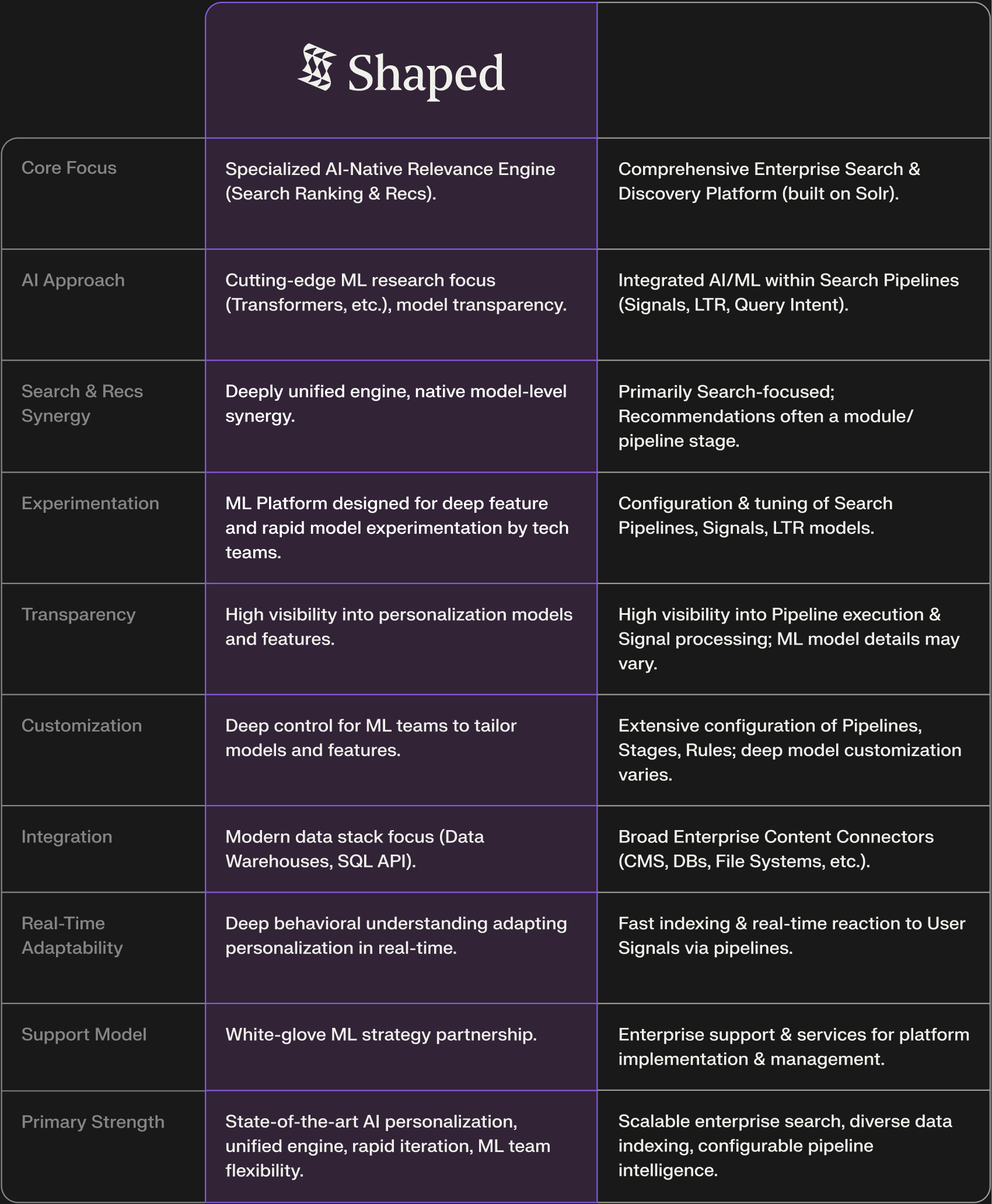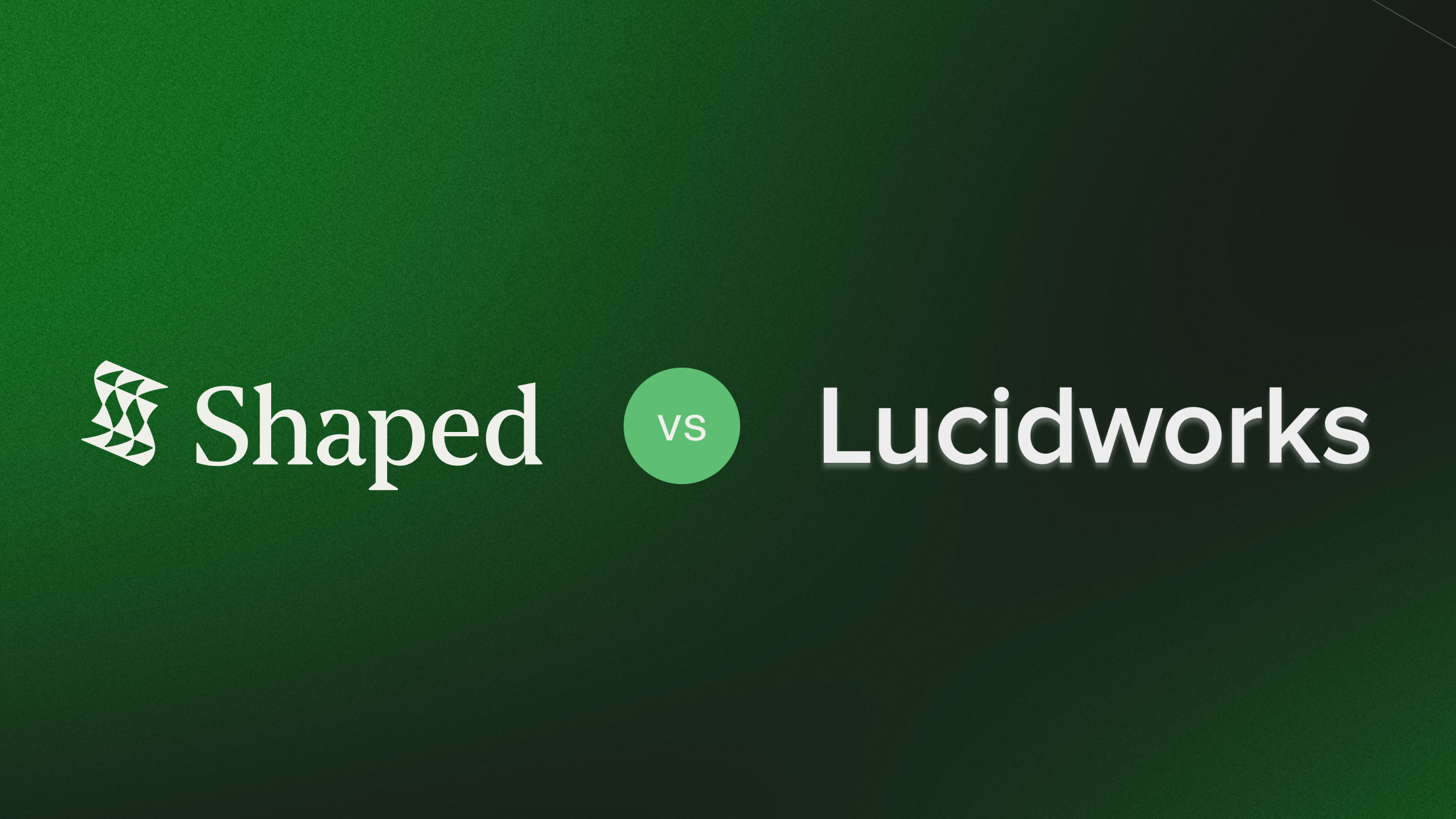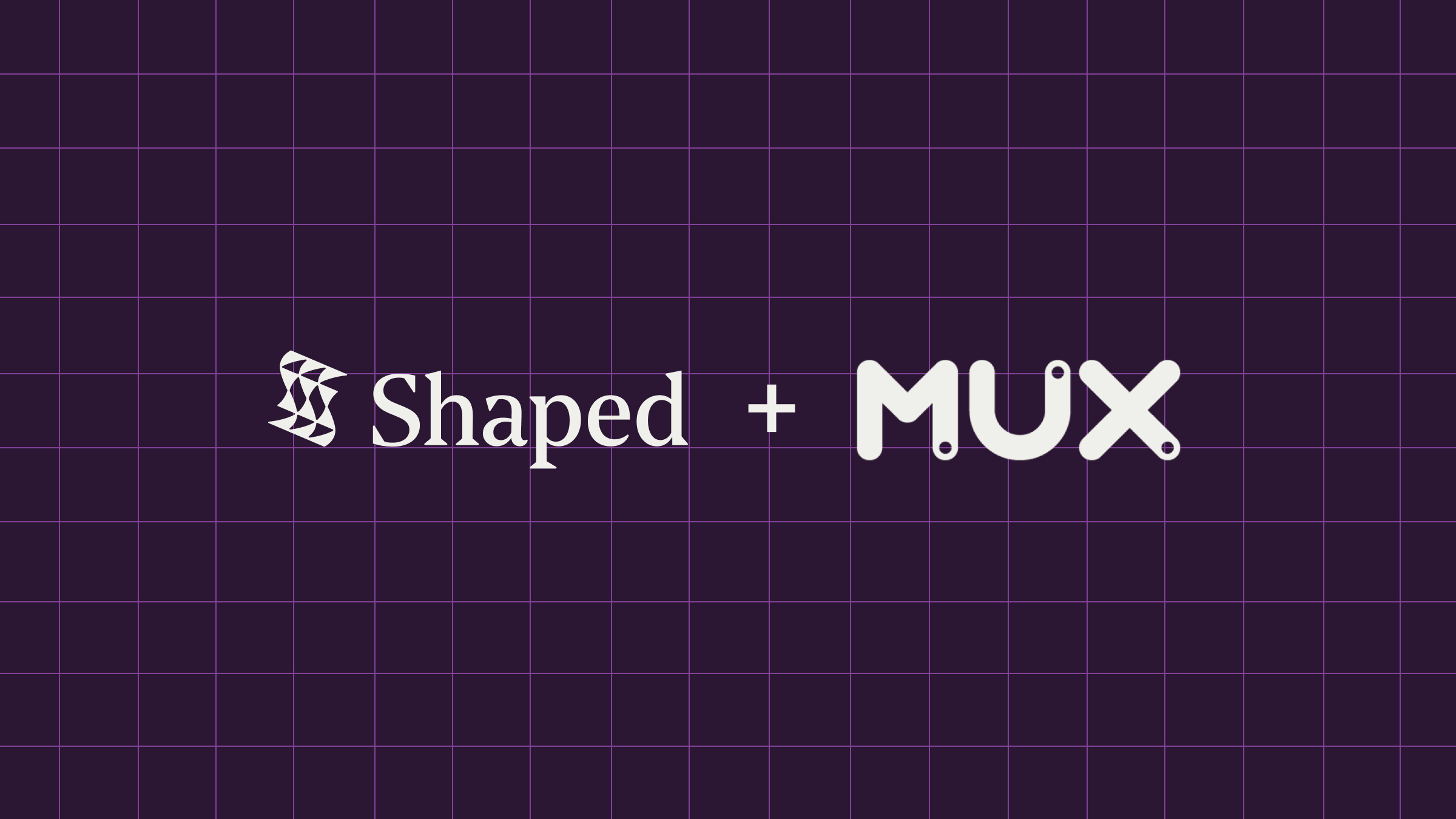Choosing the right platform to power search and recommendations is critical for delivering engaging digital experiences. Lucidworks, with its Fusion platform built on Apache Solr, is a major force in the enterprise search market. It offers a powerful, scalable solution for indexing diverse content and leveraging AI/ML techniques like signal processing and Learning to Rank (LTR) to improve relevance across websites, intranets, and commerce applications.
However, the landscape is evolving rapidly with the emergence of specialized, AI-native platforms like Shaped. Shaped focuses intensely on providing state-of-the-art deep learning models specifically for optimizing personalized search ranking and recommendations, offering deep control and flexibility to technical teams.
While both platforms aim to enhance discovery using AI, their foundational technologies, primary focus areas, and approaches to personalization differ significantly. This article compares Shaped and Lucidworks Fusion, helping businesses understand which platform best aligns with their needs, particularly when prioritizing cutting-edge AI personalization and empowering ML teams.
What are AI-Powered Search and Recommendation Platforms?
Modern relevance platforms utilize advanced machine learning to provide deeply personalized discovery far beyond traditional search algorithms. They analyze user behavior, item attributes, and contextual cues to power features like individually tailored "For You" content feeds, predictive product recommendations driving specific business goals, search results dynamically ranked based on learned user preferences, and the ability to surface semantically relevant information even without exact keyword matches. Platforms like Shaped are purpose-built to excel in these areas, using continuously learning AI models to maximize user engagement and achieve strategic objectives.
Core Focus: AI-Native Relevance Engine vs. Enterprise Search & Discovery Platform
The primary mission of each platform sets them apart.
- Shaped: Is a specialized, AI-native platform engineered specifically for optimizing personalized search ranking and recommendations using the latest deep learning techniques. The focus is squarely on maximizing relevance through sophisticated user behavior modeling and providing flexibility for ML teams.
- Lucidworks Fusion: Is a comprehensive enterprise search and discovery platform built on Solr. Its strengths lie in indexing and searching across vast, diverse enterprise data sources (structured and unstructured), applying AI/ML techniques (like signals, LTR) within configurable query pipelines to improve search relevance across various applications (e-commerce, knowledge management, site search).
Approach to AI: Deep Learning Specialization vs. Integrated Search Intelligence
How AI is architected and applied differs based on the core focus.
- Shaped: Leverages state-of-the-art deep learning models (e.g., transformers) as its core engine for understanding sequential user behavior, context, and item semantics. Transparency and access to modern ML techniques are central.
- Lucidworks Fusion: Integrates AI and ML capabilities into its enterprise search framework. This includes processing user signals (clicks, conversions), enabling Learning to Rank (requiring external model training and feature definition), query intent detection, and other techniques applied through configurable pipelines and stages. While powerful, it may rely less on the very latest deep learning architectures for personalization compared to Shaped's specialized focus.
Unified Search & Recommendations: Deep Engine Synergy vs. Search-First with Relevance Modules
How the core discovery functions are integrated.
- Shaped: Built upon a natively unified engine where the same underlying models contribute to understanding user intent for both personalized search ranking and recommendations, enabling deep, inherent synergy.
- Lucidworks Fusion: Is fundamentally an enterprise search platform. While it provides recommendation capabilities, these are often implemented as specific query pipeline stages or modules leveraging signals and search results, rather than stemming from a single, unified deep learning model like Shaped's. The approach is typically search-first.
Experimentation & Customization: ML Platform Flexibility vs. Search Pipeline Configuration
Empowering innovation and tailoring.
- Shaped: Designed as an ML platform, offering significant flexibility for technical teams to experiment with features, different relevance models (within its framework), ranking objectives, and complex personalization strategies.
- Lucidworks Fusion: Provides extensive customization through configuring query pipelines, index stages, signal processing rules, boosting strategies, and LTR models. Experimentation often occurs within this pipeline framework, potentially offering less flexibility for trying fundamentally different deep learning model architectures compared to Shaped.
Transparency & Control: Model Insights vs. Pipeline & Signal Visibility
Understanding the system's logic.
- Shaped: Emphasizes transparency into the AI models, allowing teams to understand feature importance and the factors driving personalized rankings.
- Lucidworks Fusion: Offers strong visibility into the configuration and execution of its search pipelines, signal processing, and how relevance scores are computed based on its configured stages. Transparency into the internal workings of specific ML models used (especially if externally trained for LTR) might vary.
Ease of Integration: Data Stack Focus vs. Broad Enterprise Content Connectivity
Connecting to your data sources.
- Shaped: Focuses on seamless integration with the modern data stack (data warehouses via SQL API), aligning with data and ML team workflows.
- Lucidworks Fusion: Excels at connecting to and indexing a wide array of enterprise content sources (databases, file systems, CMS, web crawls) through its robust connector framework, reflecting its enterprise search heritage.
Real-Time Adaptability: Behavioral Deep Learning vs. Signal Processing & Indexing Speed
Reacting to changes instantly.
- Shaped: Leverages deep learning to adapt personalization in real-time based on evolving user behavior patterns and context within a session.
- Lucidworks Fusion: Offers fast indexing capabilities (leveraging Solr) and can react quickly to user signals (clicks, purchases) that are fed back into its query pipelines to influence subsequent results. Real-time behavioral adaptation might be more tied to this signal processing than deep session understanding.
Empowering Businesses: ML Partnership vs. Enterprise Search Implementation Support
Guidance and strategic assistance.
- Shaped: Provides white-glove support with dedicated ML engineers acting as strategic partners, focused specifically on optimizing relevance models and achieving personalization goals.
- Lucidworks Fusion: Offers enterprise-level support and professional services focused on implementing, configuring, tuning, and managing the Fusion platform for enterprise search and discovery use cases.
Driving Measurable Results: Focused Relevance KPIs vs. Enterprise Search Effectiveness
Measuring success and impact.
- Shaped: Directly targets the optimization of core search and recommendation metrics (CTR, conversion, engagement) through advanced AI personalization techniques.
- Lucidworks Fusion: Aims to improve broader enterprise search effectiveness, knowledge worker productivity, e-commerce findability, and other outcomes tied to efficiently searching and discovering information within the enterprise context.
Shaped vs. Lucidworks Fusion: Feature Comparison

Conclusion: Choosing Specialized AI Relevance vs. Robust Enterprise Search
Lucidworks Fusion is a formidable platform for organizations needing powerful, scalable enterprise search capabilities across diverse datasets, enhanced with configurable AI-driven relevance features. Its strength lies in its robust indexing, pipeline flexibility, and ability to tackle complex enterprise information discovery challenges.
However, for businesses whose paramount goal is to achieve state-of-the-art personalization in customer-facing search results and recommendations, leveraging the latest deep learning advancements, and providing their ML teams with maximum control and flexibility, Shaped offers a more specialized and potentially more advanced solution.
Shaped's laser focus on AI-native relevance, its truly unified engine, and its design as an ML experimentation platform enable teams to push the boundaries of personalization beyond what might be easily achievable within a traditional enterprise search framework. If maximizing the intelligence and adaptability of personalized discovery is the core objective, Shaped provides the purpose-built tools to lead.
Ready to explore the difference a dedicated AI-native relevance engine can make?
Request a demo of Shaped today to see it in action with your specific use case. Or, start exploring immediately with our free trial sandbox.




